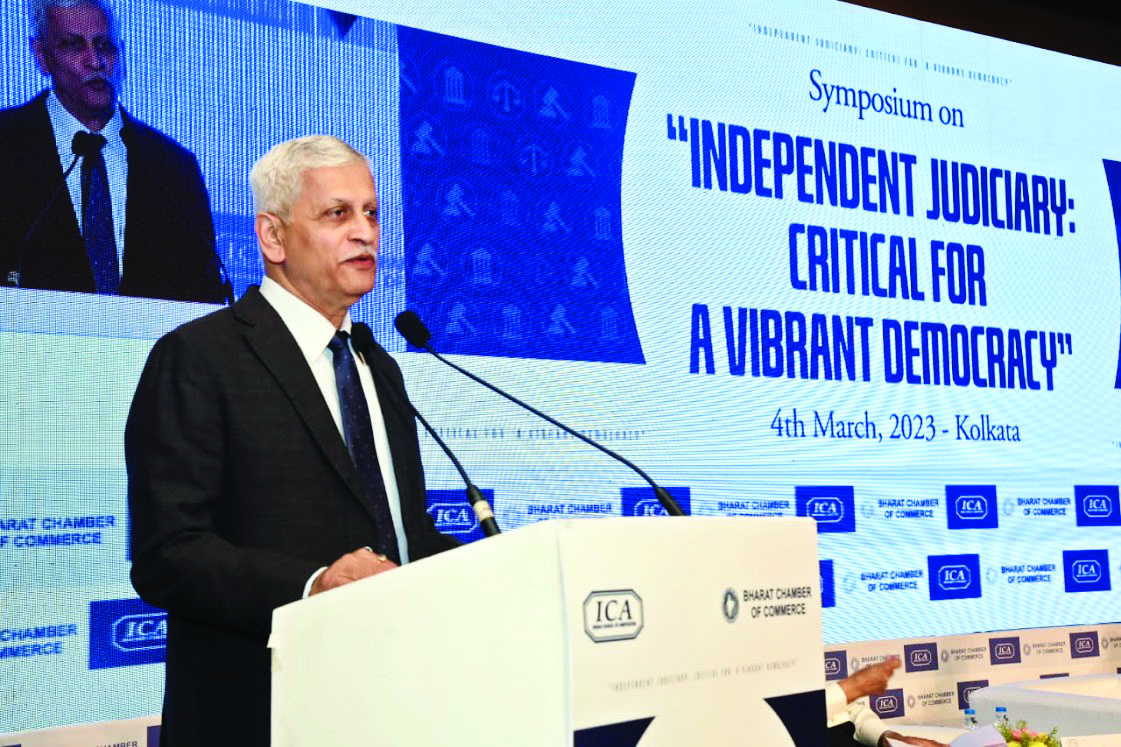‘Independence of judiciary must to uphold democracy’

Kolkata: Former Chief Justice of India Justice Uday Umesh Lalit said it is important to protect judiciary at the district level as it has to provide not only the finest solutions but also face unprecedented extraneous pressure and problems.
Speaking on Saturday at a symposium on “Independent judiciary: Critical for a vibrant democracy” hosted by the Bharat Chamber of Commerce here, he said there have been instances of court decisions being affected by executive interference, but these have been appropriately handled to maintain the judiciary’s independence.
He also added: “We must protect our district judiciary which comes under tremendous pressure as compared to their superior judiciary personnel. Life is unfortunately very tough for persons manning district judiciary. They may pass orders which may not be to the liking of a person sitting in an appellate judiciary but restraint must be shown in making comments on the conduct of such judicial officers unless we are certain about it.”
Citing how the independence of the judiciary starts at the district level, he explained: “Our Constitution recognises and gives us an apparatus. The district judiciary is not under the control of anybody else except the High Courts in the state. All their postings, promotions, appointments and even transfers are supposed to be only at the recommendation of the High Courts. That’s where the foundation lies concerning no outside interference in the functioning of the judiciary. Even at the level of SC and HC, which we call superior judiciary, a number of articles in the Constitution assure and ensure there is no interference in the functioning of every individual judge or the judiciary in general.”
The judiciary is an independent institution and belongs to a democratic political structure. Its independence does not imply arbitrariness or lack of accountability, he said.
The former CJI further added that a court’s independence is not a new concept, but its meaning is still unclear due to the strong constitutional framework, democratic traditions, and the people.
Dispute resolution is the cornerstone of rule of law government, hence a democratic society cannot exist without an independent judiciary, he maintained.
Citing the P Sambamurthy case as an example where a constitutional amendment subjected the decisions of the adjudicating body to the will of the executive, he said: “This bad constitutional amendment was struck down by the Supreme Court on the grounds of independence of the judiciary which is part of the basic structure doctrine under the Constitution. The apex court took resort in this very principle when it struck down the amendment which introduced the National Judicial Appointments Commission.”
Supreme Court judge Justice Hima Kohli said the independence of the judiciary is a “moral imperative”. She said the concept of an independent judiciary is considered to be two-fold — the institutional independence of the judiciary and the individual independence of the judiciary where judges are free to decide matters without any influence or pressure, direct or indirect, from any quarter for any reason.
“Article 50 of the Indian Constitution states clearly, the state should take steps to separate the judiciary from the executive in the public service of the state. This reflects the need for a clear separation of powers between the executive and judiciary to avoid conflict of interest and ensure justice is not compromised. The independence of the judiciary has been upheld by the Supreme Court in a host of landmark cases,” she highlighted.



